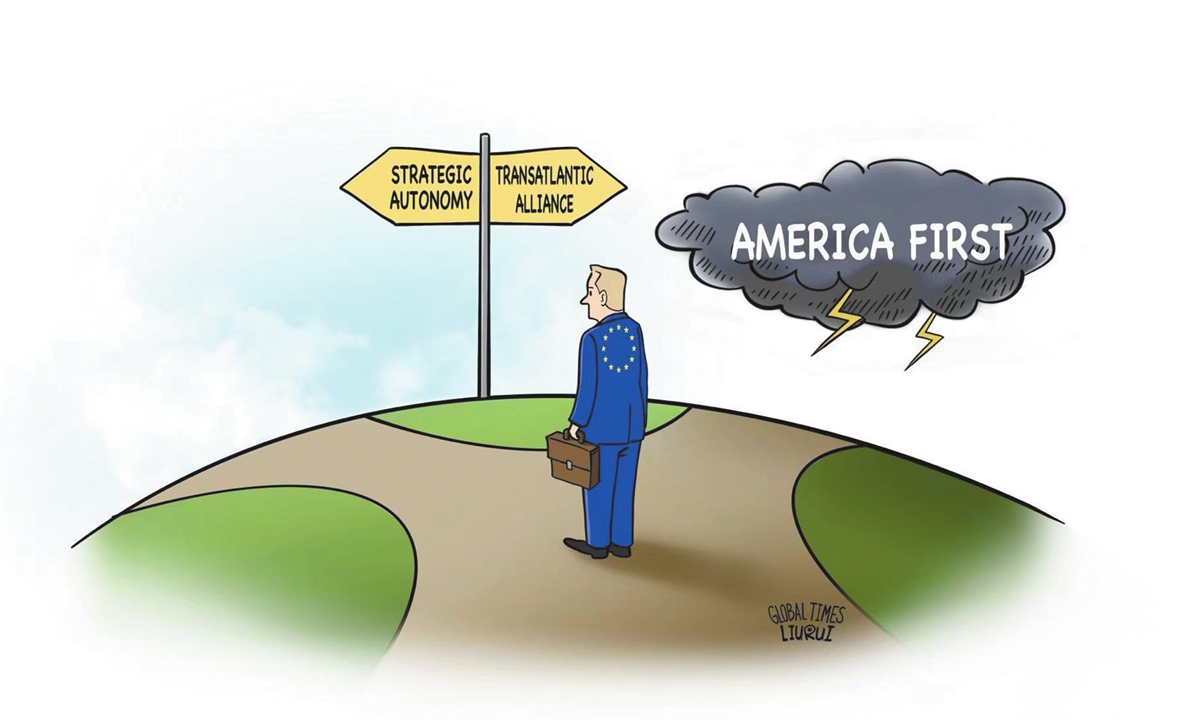
Illustration: Liu Rui/GT
On the occasion of the 50th anniversary of the establishment of bilateral diplomatic ties between China and the EU as well as the changing global landscape, there have been frequent interactions between the two sides.
Following the visits of Portugal's Minister of State and Foreign Affairs Paulo Rangel, French Foreign Minister Jean-Noël Barrot and European Commissioner for Trade and Economic Security Maros Sefcovic, all of whom have visited China in late March, Spanish Prime Minister Pedro Sanchez will soon travel to China in April.
The visits of European leaders to China are definitely not coincidental. They reflect a wise choice made by European decision-makers under both internal and external pressures.
In the face of internal and external challenges, the EU is forced to reassess its relationship with China and make corresponding adjustments. Internally, the ongoing Russia-Ukraine conflict has dealt a serious blow to Europe' s economy and society, resulting in economic sluggishness, fiscal deficits, energy shortages and high inflation. Externally, the new US administration shows an unwillingness to commit to European security, and threatens to impose far larger tariffs on the EU, which has further exacerbated the anxiety and outrage within the EU.
Meanwhile, despite the fluctuations in China-EU relations, the economic and trade cooperation between the two sides has continued to develop. According to China Customs statistics, China-EU bilateral trade volume reached $785.8 billion in 2024, of which China's exports to the EU amounted to $516.4 billion. These remarkable data fully demonstrates that the power of market laws is gradually penetrating the political barriers between China and the EU, guiding the bilateral ties toward pragmatic cooperation and mutual benefit.
Nevertheless, the existing contradictions and problems in China-EU relations cannot be resolved solely through the visits of European officials. While there is significant potential for bilateral cooperation in terms of economic structure and technological complementarity, the crux lies in the mindset of European decision-makers.
Take EU trade chief Sefcovic's visit to China as an example. The European Commission emphasizes that this visit to China is intended to "foster a more balanced and cooperative trade relationship" between the EU and China, while Sefcovic, before heading to Beijing, suggested technology transfer as a condition of Chinese investment in Europe's EV industry, which, fundamentally, is not a partnership based on equality.
The contradictory statements from EU officials reflect the complexity of the trilateral relationship between China, the US and Europe. Both the US and Europe perceive China's rise as a major challenge to the Western hegemonic system and see China as a "systemic rival." Thus, the suppression of Chinese high-tech companies, the imposition of high tariffs on China and the strict scrutiny of Chinese investments in the West are strategic measures rather than impulsive reactions.
The EU is also facing pressure from the US. The growing rifts with the US, the escalation of trade conflicts and the decline in political mutual trust have all caused considerable anxiety among EU decision-makers. As a result, maintaining close economic ties with China has inevitably become a strategic option for the EU and its member states when the transatlantic relationship is fracturing.
EU Commission President Ursula von der Leyen stated in February that the EU-China relationship is "one of the most intricate and important anywhere in the world" and how to manage it will be "a determining factor" for Europe's future economic prosperity and national security. She added that we need to "rebalance this relationship" and "find solutions in our mutual interest." Her remarks highlight the significance and complexity of China-Europe relations and indicate that senior EU leaders are reflecting on the rigid dynamics that have characterized bilateral ties in recent years.
For China, the EU's pursuit of greater strategic autonomy and its willingness to engage with China is a positive development. However, given the EU leaders' swaying attitudes toward China, we should strive to find common ground with the EU amid competition and interest balancing. Taking the 50th anniversary of bilateral diplomatic relations as an opportunity, China and Europe should enhance political trust, deepen mutually beneficial cooperation and steer our relations onto a path that is conducive to global economic growth, global governance cooperation and sound development.
The author is a senior research fellow at the Institute of European Studies at the Chinese Academy of Social Sciences. opinion@globaltimes.com.cn




